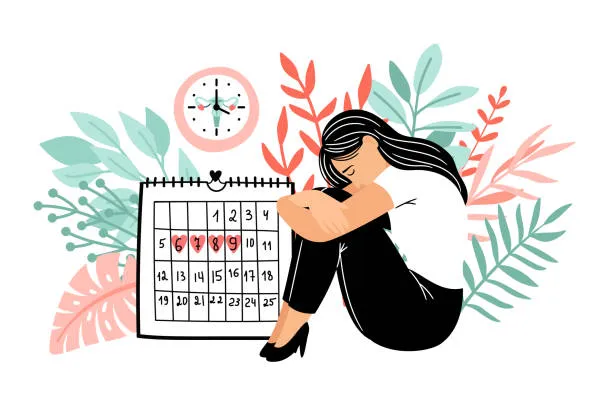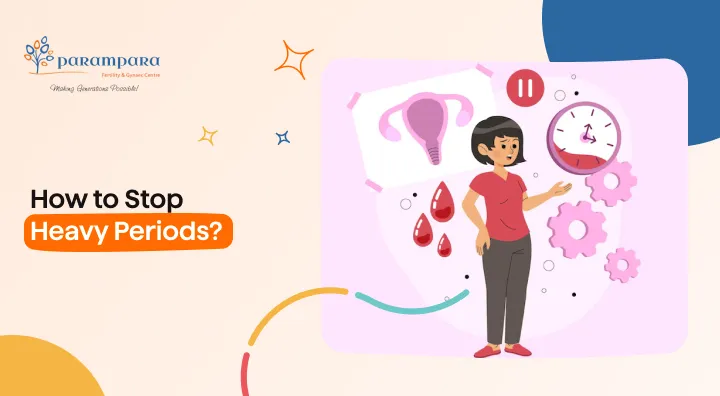
Are Painful Periods Normal?
Menstruation is a natural part of life for many women, but for some, it comes with significant discomfort. Painful periods, or dysmenorrhea, can range from mild cramping to severe pain that disrupts daily activities. While some level of discomfort is common, understanding what is considered normal and when to seek help is crucial for managing menstrual health. In this blog, we’ll look at the details of painful periods.

Is pain during periods good or bad?
Pain during periods is a common experience for many women, often resulting from the uterus contracting to shed its lining. Mild to moderate cramps are typically considered normal and can even indicate that the body is functioning as it should. However, severe pain is usually not normal and may signal underlying issues such as endometriosis or fibroids. Understanding the difference between normal and concerning pain can help you manage your menstrual health more effectively.
Are period cramps normal?
Yes, period cramps are normal for many women. They occur as the uterus contracts to help shed its lining during menstruation. Most women experience some level of discomfort, which can range from mild to severe. This cramping typically starts a day or two before your period begins and may last for a few days.
While some cramping is expected, it’s important to recognize that every woman’s experience can differ. Understanding the nature of your cramps can help you better navigate your menstrual health.
Are cramps normal before period?
Yes, cramps before your period are common and typically normal. Known as premenstrual cramps, they result from hormonal changes as your body prepares for menstruation.
These cramps occur due to uterine contractions and can vary in intensity. Many women also experience PMS symptoms, such as bloating, breast tenderness, and mood swings. Even though some discomfort is natural, individuals will experience things very differently. Keeping track of your symptoms can help you manage any discomfort.
Are cramps normal during periods?
Absolutely! Cramps during your period are entirely normal and are a common experience for many women. These cramps typically occur as a result of the body’s natural processes, particularly the contraction of the uterus as it sheds its lining.
The intensity of cramps can vary from month to month and from person to person. Some women may experience mild discomfort, while others may have more severe pain that can disrupt daily activities. It’s not unusual for cramps to peak in the first couple of days of menstruation and then gradually lessen.
Are cramps normal after period?
Some women may experience cramps after their period, and this can be quite normal. Remaining contractions of the uterus as it shrinks back to its original size after losing its lining are likely the cause of these post-menstrual cramps. Hormonal changes can also contribute to this discomfort as your body adjusts following menstruation.
Typically, these cramps are mild and should resolve quickly. However, if you experience significant pain or if the cramps persist longer than a few days, it may indicate an underlying issue. Conditions such as endometriosis, fibroids, or other gynecological concerns can contribute to postperiod pain.
Why are my period cramps worse than usual?
There are several reasons why period cramps might feel worse than usual. Stress, changes in diet or exercise, or hormonal fluctuations can all contribute to increased discomfort. Conditions like endometriosis or fibroids may also cause more severe pain. If your cramps suddenly worsen, it’s a good idea to seek medical advice.
Are painful periods a sign of good fertility?
Painful periods, known as dysmenorrhea, do not inherently signify good or poor fertility. Many women experience cramps during their menstrual cycles regardless of their reproductive health status. However, excessively painful periods can indicate conditions such as endometriosis or fibroids, which can impact infertility. Therefore, while some discomfort is common, significant pain may warrant further investigation to understand its implications for reproductive health.
Can you have a painful period and be pregnant?
Yes, you can experience painful cramps during early pregnancy. Some women may confuse these cramps with menstrual cramps. This discomfort can occur due to implantation, which happens when a fertilized egg attaches to the uterine lining. While some level of cramping is normal in early pregnancy, it’s essential to be aware of any unusual or severe pain, as it could indicate other issues.
When should you seek help?
If cramps are:
- Severely painful or debilitating
- Accompanied by heavy bleeding
- Sudden or significantly worse than usual
These may be signs to consult a doctor.
Turning Hope into Happiness
Experience the Joy of Becoming Parents!
Call Now
Tips for managing painful periods
Heat Therapy: Use a heating pad on your abdomen to relax muscles.
Herbal Teas: Sip calming teas like chamomile or ginger for relief.
Regular Exercise: Engage in light activities like walking or yoga to boost blood flow.
Stay Hydrated: Drink plenty of water to reduce bloating and cramps.
Dietary Choices: Eat anti-inflammatory foods and limit salt, sugar, and caffeine.
Essential Oils: Massage your abdomen with lavender or peppermint oil.
Relaxation Techniques: Practice deep breathing or meditation to ease stress.
Sleep and Rest: Ensure adequate sleep and take time to rest.
Acupuncture or Acupressure: Try these therapies for pain relief.
Magnesium and Calcium: Include magnesium-rich foods and calcium in your diet.
These simple strategies can help manage period pain and improve your comfort.
Conclusion
For many women, painful periods are a common experience, characterized by cramps and discomfort that can vary in intensity. While mild pain is usually considered normal, severe or debilitating cramps may indicate the following health issues that warrant further investigation. Understanding your body’s signals is key to managing menstrual health effectively. If your period pain interferes with your daily life or suddenly worsens, it’s important to consult a healthcare professional. With the right approach, you can find relief and better understand your menstrual cycle, empowering you to take charge of your reproductive health.




